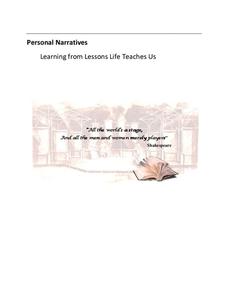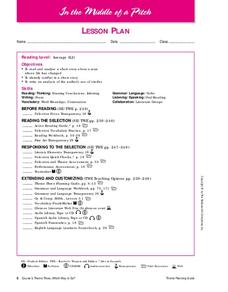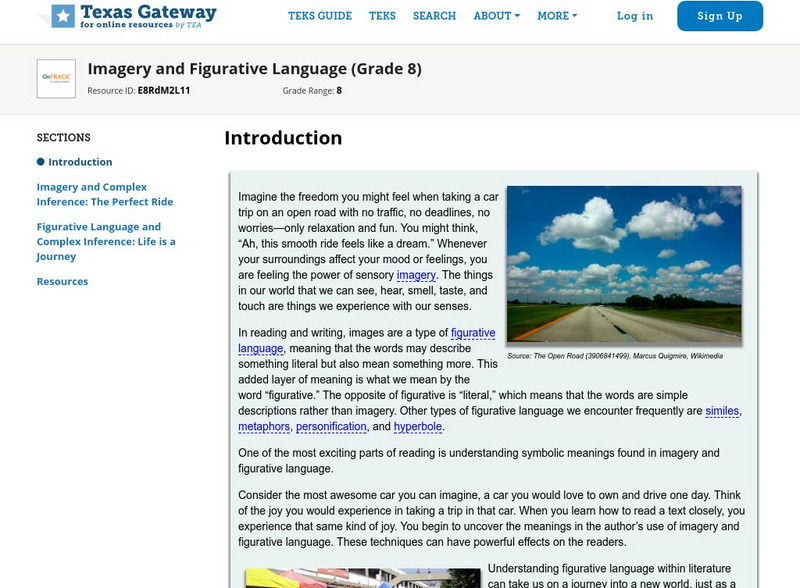Council for the Curriculum, Examinations and Assessment
Managing Influences and Making Decisions
Teenagers could use a little help with their decision-making process. Guide them through the steps of mature choices, outside influences, and expected consequences with a lesson about making decisions.
National Security Agency
Are You Game? A Lesson Connecting Fractions and Probability
Exactly how fair are the board games children grow up playing? Young mathematicians investigate this questions as they work their way through this five-lesson series on basic probability.
West Corporation
Making Inferences – Use Your Mind to Read!
How can you tell if someone is happy? The lesson works with elementary and middle school scholars to activate their schema and pay attention to details to make inferences in their daily lives, poetry, and other literature. Cleverly...
Roald Dahl
George's Marvelous Medicine
Six lessons comprise a unit about Roald Dahl's George's Marvelous Medicine. Over time, scholars explore themes such as the power of words, exciting writing, and mixed feelings. They examine the writing's literary devices, persuasive...
Thoughtful Education Press
Personal Narratives: Learning from Lessons Life Teaches Us
"First Appearance," Mark Twain's tale about overcoming stage fright, serves as a model of a personal narrative and gets young writers thinking about milestones in their own lives. After examining student models and considering the...
Columbus City Schools
Sedimentary Rocks
Turn your class discussion of rock formation from ho-hum to holy hornfels! Junior geologists gain experience in identifying rock types and rock origins, with an emphasis in hypothesizing the environment needed to form certain...
Trinity University
Explain Yourself: An Expository Writing Unit for High School
Introduce expository writing with a unit that asks writers to craft an essay to explain a belief, value, or priority that is important to them. Mini-lessons within the unit focus on crafting thesis statements and conclusions, selecting...
Curated OER
Sophocles' Oedipus the King
Introduce your class to the Greek tragedy with a study of Sophocles’ Oedipus the King. Learners examine the features of a Greek tragedy, Sophocles’ achievements and contributions, and the universal themes that make the drama an...
Intel
What Does This Graph Tell You?
What can math say about natural phenomena? The fifth STEM lesson in this project-based learning series asks collaborative groups to choose a phenomenon of interest and design an experiment to simulate the phenomenon. After collecting...
Curated OER
Frindle: A Guiding Reading Unit
Guide your class through a reading of the popular children's book, Frindle, with this comprehensive literature unit. Starting with a brief introduction to the guided reading process, the class goes on to read the story two chapters...
Curated OER
Which Way To Go?
Students prepare for and respond to literature selections. This package of lessons includes nine lessons from the American Literature series, each covering a different reading selection about a man making a key life decision. Pre-reading...
Gwinnett County Public Schools
Analysis of the Tuck Everlasting and The Birchbark House Text Exemplars
Looking to introduce some text-based questions into your ELA lessons? Practice the kinds of skills the Common Core demands with the seven text-based questions and the essay prompt provided here. Designed to be a three-day lesson, day one...
Pottsgrove School District
Tall Tales
Young readers compare and contrast digital and print versions of tall tale text. The resource includes a character analysis in which pupils compare and contrast traits, and make inferences about what the characters do and say. They...
Curated OER
"The Wind" by James Reeves
Inntroduce primary learners to essential critical reading strategies with an activity based on James Reeves' poem, "The Wind." Learners listen as the poem is read, first as a riddle, and then re-read with the title visible. The...
Curated OER
Inventory of Ebenezer Wells (1730-1783), Nephew of Ebenezer Wells (1691-1758)
Students understand that farming was still the backbone of the economy at the beginning of this period. Students compare inventories from the first turn (1680-1720) and the second turn (1780-1820).
E Reading Worksheets
E Reading Worksheets: Making Predictions Worksheets and Lessons
In this learning module, students will learn more about making predictions in reading. Worksheets and a leson are provided to support Tier I, Tier II, and Tier III students.
Polk Brothers Foundation Center for Urban Education at DePaul University
De Paul University: Center for Urban Education: Lincoln's Choice [Pdf]
"Lincoln's Choice" is a one page, fictional, reading passage about young Abraham Lincoln saving a friend from drowning. It is followed by constructed-response questions which require students to provide evidence from the story; it...
Texas Education Agency
Texas Gateway: Relevant Information and Valid Inferences
[Accessible by TX Educators. Free Registration/Login Required] In this lesson, you will learn how to make the information in your expository essays relevant and your inferences valid.
Khan Academy
Khan Academy: Strongly Supported Inferences Learn More
How do we recognize what is "strongly supported?" Some questions on the logical reasoning section of the LSAT ask what additional information is supported by a stimulus. These are similar to questions that ask you to identify the...
Polk Brothers Foundation Center for Urban Education at DePaul University
De Paul University: Center for Urban Education: My Summer [Pdf]
"My Summer" is a one page, fictional, reading passage about a child who visited his grandmother in Phoenix for the summer. He was surprised at how hot it was there. It is followed by open-ended questions which require students to provide...
Texas Education Agency
Texas Gateway: Descriptive vs. Comparative Investigations
In the following lesson students will learn the differences between descriptive and comparative investigations.
SRI International
Performance Assessment Links in Science: Follow Those Tracks
This lesson plan requires students to make an inference (hypothesis) about two animals based on the tracks they leave behind. Students are asked to write a story explaining their inference.
Polk Brothers Foundation Center for Urban Education at DePaul University
De Paul University: Center for Urban Education: See Our Progress [Pdf]
"See Our Progress" is a one page, fictional, reading passage about students who turned a vacant lot into a prairie garden and then were interviewed and shown on the television news. It is followed by questions which require students to...
Texas Education Agency
Texas Gateway: Imagery and Figurative Language (Grade 8)
In this lesson, students learn how to make complex inferences and use textual evidence such as imagery and figurative language to support understanding.




















